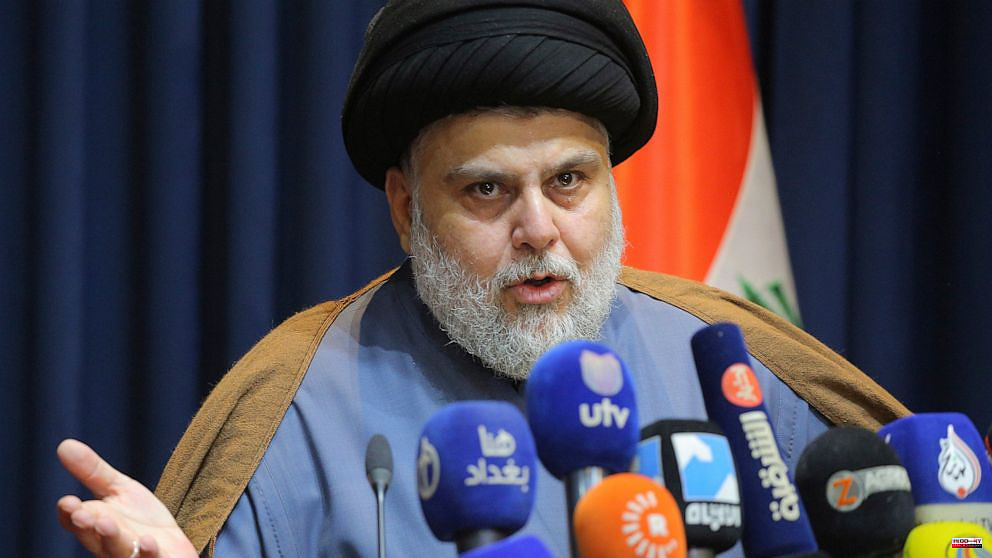BAGHDAD -- Monday's announcement by Iraqi leaders was a promise to continue with efforts to form a government after the resignation of 73 members of parliament in the midst a long political impasse.
However, the unprecedented withdrawal of members of Muqtada Al-Sadr, a powerful Shiite cleric, dramatically changes the political landscape and throws into doubt the possibility for government formation talks.
Al-Sadr is taking a big gamble. He is one of the most powerful politicians in Iraq and has a large street following. This means that he will be unable to represent his political party in parliament for the first times since 2005.
This surprise move is intended to end a political impasse that has existed for eight months, just after general elections were held.
Al-Sadr was declared the October winner, with him receiving 73 of 329 Parliament seats. His Iran-backed Shiite opponents, who lost around two-thirds their seats, also suffered a setback and rejected the results.
The two sides have been engaged in a fierce competition for power since then. Despite growing challenges, such as severe droughts and war in Ukraine, they are still fighting for control.
Al-Sadr, with his allies, had been determined to form a majority government exempting the Iran-backed factions. Al-Sadr hasn't been able to gather enough legislators to secure the two-thirds majority required to elect Iraqia's next president. This is a crucial step before naming the next prime Minister and choosing a Cabinet.
He ordered his legislators to resign on Sunday calling it a "sacrifice", which he was making in the name of the country's good. Jaafar al Sadr, his cousin and nominee as prime minister, withdrew Monday.
Ihsan Al-Shammari, a political analyst, stated that Muqtada's departure will strengthen his political position and help him win sympathy from the disenchanted Iraqi streets fed up with politicians.
He said, "He knows there will be street protests, and this is going to open communication channels, making him the sole survivor."
Now the question is whether political parties can form a government with al Sadr, the opposition.
Iranian-backed groups, which were supported by Sadrist lawmakers' resignations, are now expected to control the majority of parliament.
Iraqi law states that if a seat becomes vacant in parliament, the candidate with the highest number of votes from the district is the one who takes it. Al-Sadr's opposition from the Coordination Framework would win in this instance, which is a coalition of Shiite parties supported by Iran and their allies.
Shammari stated that any government in which Muqtada is not involved will be dead. He also wondered if Iran-backed parties would be willing and able to negotiate with Masoud Barzani of the Kurdish Democratic Party, a leader with whom there is deep-seated distrust.
In response to protests in late 2019, which saw thousands of people rally against corruption, poor services, and unemployment, the election was held several months before expected.
Mohammed Halbousi, Parliament Speaker, stated Monday that government formation efforts would continue on the basis of certain "other political understandings", without going into detail.
Shiite politician stated that he expects the political process will continue with the Coordination Framework. It will have more than 100 members after al-Sadr's departure. The Coordination Framework is seeking to form the next government.
He said that negotiations would continue with other Sunni or Kurdish blocs, but he spoke under anonymity as he wasn't authorized to make official statements.
He stated that the next government could face protests and disturbances on the streets, particularly from al-Sadr followers, and that its success would depend upon the government's ability manage them.
Unnamed Coordination Framework member admitted that they were confused by al-Sadr’s withdrawal.
"We don't know the motivations for Muqtada’s withdrawal. ... He said that it was a surprise to all of us. He pointed out that the resignations were made while parliament was on recess, and that new developments could still occur.
He said, "We have one month for parliament to come back and everything is possible within this month."












